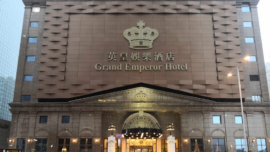Last year, SJM’s gaming revenues dropped three times more than Macau’s average, missing by a wide margin the investors’ estimations after VIP rooms lost HK$10 billion in revenues. The historic casino operator is one of the most affected operators by the current high roller crisis in Macau caused by the anti-graft campaign launched by Chinese authorities.
The company reported yesterday that its gaming revenues reached HK$79.3 billion last year, a drop of 8.8 per cent compared to 2013 (HK$86.9 billion). The decline was more than three times the average of the industry here. Gaming revenues in Macau decreased 2.6 per cent last year, according to Gaming Inspection and Co-ordination Bureau data.
The performance was also a disappointment for investors. The market was expecting a marginal advance in SJM revenues to HK$88.9 billion last year, with predictions ranging from HK$91 billion to HK$85 billion, according to 18 analysts contacted by Bloomberg. In the end, SJM revenues last year were around 10 per cent short of what the market was expecting.
The EBITDA (profit minus interest, taxes, depreciation and appreciation, also known as operational profit) declined 10.5 per cent to HK$7.8 billion last year, with the profit attributable to owners of the company plunging 12.7 per cent to HK$6.7 billion. In other words, SJM made HK$1 billion less in profits than in 2013.
Generous pay
Despite the underperformance compared to its peers here and a drop in revenues and profits, the company announced that directors’ remuneration last year went up 18 per cent. SJM paid its management HK$102 million in 2014, around 1.5 per cent of the group’s total profit, the report revealed.
The VIP segment, where SJM makes 60 per cent of its gaming revenues, was the main driver behind last year’s plunge. High rolling gamblers generated HK$48.2 billion in revenues, 17.3 per cent less than in 2013 (HK$58.3 billion). In other words, SJM’s VIP rooms ‘lost’ HK$10 billion last year.
But there’s more. The drop in VIP revenues growth rate in SJM’s casinos was also 70 per cent higher than Macau’s average (an overall decrease of 10.9 per cent). ‘The downturn in VIP gaming revenue, which manifested itself mainly in the second half of the year, was brought about primarily by changes in administrative policies of Mainland China. These changes, combined with weakness in some sectors of the China economy, affected upper-end play in each of the Group’s gaming segments: VIP, mass market and slot machines’, wrote the company in a filing submitted to the Hong Kong Stock Exchange yesterday.
Mass problems
Mass market growth last year wasn’t, however, enough to offset the VIP weakness as mass tables only account for a third of SJM’s total revenues. Mass revenues increased 8.9 per cent to HK$29.7 billion from HK$27.2 billion in 2013. Still, the growth rate was slightly half that recorded by its peers. Macau’s total mass revenues went up by 15.5 per cent, DICJ said.
With revenues going down and staff costs rising, the company’s profit margin shrunk to 9.7 per cent from 9.9 per cent in 2013.
The casino operator also said that its upcoming project in Cotai, Lisboa Palace, completed ‘substantial foundation work’ last year and is slated to open in 2017. The integrated casino resort will have three 5-star hotels and 2,000 rooms, with one of them the first hotel in the world fully designed by Karl Lagerfeld with a 20-storey tower and 270 rooms.
In Grand Lisboa, the company expanded its mass tables from 250 to 274 and reduced VIP tables from 181 to 177. SJM expects to re-open its Jai Alai property in late 2015, with a new hotel offering 130 rooms, restaurants and retail shops. Renovation work at Jai Alai is currently halted pending government approvals.























